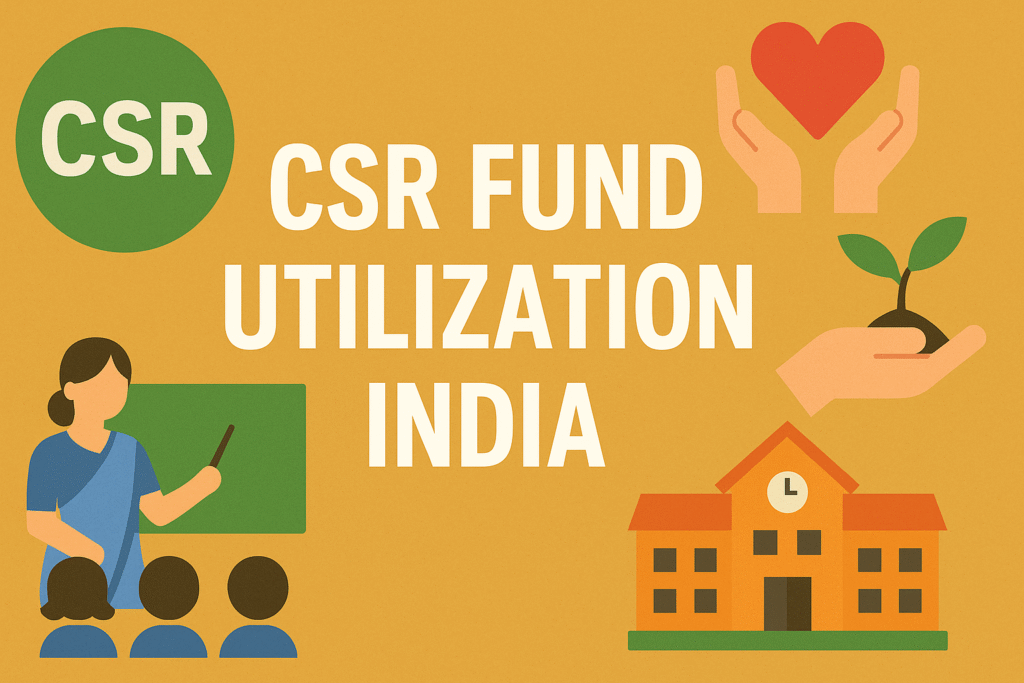CSR Fund Utilization in India: Corporate Spending, Trends & Real Impact
India Inc. is spending more on social causes than ever before. But the big question remains—is CSR fund utilization in India actually effective? From education to healthcare and rural development, let’s uncover how companies are deploying their mandated Corporate Social Responsibility (CSR) budgets and what impact they’re really making.
Understanding CSR Compliance in India: Laws & Eligibility
Corporate Social Responsibility in India was made mandatory through Section 135 of the Companies Act, 2013. Any company that meets at least one of the following criteria must spend 2% of its average net profits (last 3 years) on CSR initiatives:
- Net worth ≥ ₹500 crore
- Annual turnover ≥ ₹1,000 crore
- Net profit ≥ ₹5 crore
Companies are required to report their CSR spending in annual filings, ensuring transparency and accountability.
Key Areas of CSR Fund Utilization in India
CSR in Education & Skill Development
Education consistently receives the largest portion of CSR spending in India—nearly 35–40% annually. Companies are investing in:
- Building schools and libraries in rural areas
- Scholarships for underprivileged students
- Vocational and digital skills training for youth
Example: Infosys Foundation funds educational infrastructure and teacher training across India.
CSR in Healthcare & Sanitation
Post-pandemic, healthcare has emerged as a top priority. CSR spending in this area covers:
- Mobile health units for remote villages
- Free medical camps and screenings
- Menstrual hygiene and sanitation in government schools
Example: Tata Trusts is widely known for its long-standing work in cancer care and public health systems.
CSR in Environmental Sustainability & Green Projects
CSR compliance is increasingly tied to ESG (Environmental, Social, Governance) ratings. Companies are funding:
- Tree plantation drives and biodiversity projects
- Solar and wind energy installations
- Waste management and plastic recycling programs
Example: Adani Foundation has integrated clean energy and environment-centric CSR across multiple states.
CSR in Rural Development & Livelihood Generation
CSR implementation in backward regions focuses on bridging the rural-urban divide through:
- Construction of toilets, roads, and water tanks
- Promotion of self-help groups and microfinance
- Skill-building for agriculture and animal husbandry
Example: ITC Limited runs integrated watershed programs and rural empowerment projects.
Challenges in Effective CSR Implementation in India
Lack of Monitoring & Impact Measurement
Many CSR programs lack measurable Key Performance Indicators (KPIs), which makes it hard to track actual impact. Without third-party audits, fund leakage and misreporting are common.

Geographic Concentration in Urban Areas
A large portion of CSR funds is spent in urban or semi-urban zones due to ease of execution and visibility, leaving backward and tribal regions underserved.
Short-Term Approach Over Long-Term Vision
Many companies focus on “low-hanging fruit” projects that offer quick PR wins, instead of long-term, sustainable community development programs.
How to Improve CSR Fund Utilization in India?
Collaborate with NGOs, Government & Local Stakeholders
Partnerships with credible NGOs (DARPAN portal) and Panchayati Raj institutions ensure that funds reach the intended beneficiaries.
Use Technology & Data Analytics for CSR Monitoring
CSR dashboards, geotagged project tracking, and real-time reporting tools can enhance visibility and efficiency.
Promote Multi-Year, High-Impact Projects
Encouraging companies to commit to 3–5 year CSR projects can ensure better impact in education, rural health, and infrastructure.
Future Trends in CSR India 2025 and Beyond
- CSR alignment with UN Sustainable Development Goals (SDGs)
- Increased focus on climate action, mental health, and digital literacy
- Public-private collaborations in Tier 3 and 4 towns
- Mandatory ESG reporting alongside CSR reporting
Conclusion: Making CSR in India More Impactful
CSR fund utilization in India is evolving from mere compliance to strategic impact. The need of the hour is transparency, community involvement, and long-term vision. Companies that align CSR with their core values and local needs will build not just brand goodwill but also a better India.
💬 We Want to Hear From You!
What’s your take on CSR effectiveness in India? Are you seeing real impact in your region?
👉 Drop a comment below or share this with someone who cares about social change.
👉 Read more blogs on policy, finance, and development at SVLinker.com.

